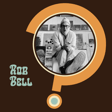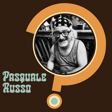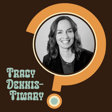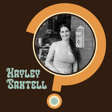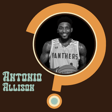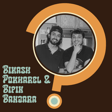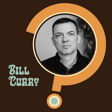Become a Creator today!Start creating today - Share your story with the world!
Start for free
00:00:00
00:00:01

Episode 8 - MoBella Russo
MoBella Russo is an interdisciplinary artist. Her work researches human connection through the foundational elements of psychology with social justice & performative art experiments. She is currently pursuing a masters degree in art therapy and counseling. Mo is my wife and the mother of our two kids.
Follow her at @mobellarusso
Transcript
Introduction and Late-Night Session
00:00:00
Speaker
What's next with Joe Krugman? See, it's the starting. Late night session. This is all the same stuff you did and the one that didn't work. Okay, let's just...
Life Decisions and Art Therapy: Joel and Mo's Journey
00:00:25
Speaker
Hello and welcome to What's Next. I'm Joel Krogman and this is my show. Today I'm doing something a little different. My wife and I sat down to talk about our lives and what we're doing and some of the big life decisions that we've recently made. And part of this podcast is
00:00:44
Speaker
my own discovery into who I am and who I want to be and my wife is very closely connected to that. She's on her own path and building her own life as well but we're doing it together and supporting each other and so I wanted to talk with her about some of these big decisions that she's made recently that we've made together as a family.
00:01:10
Speaker
Mo is an artist. She is a grad student pursuing a master's degree in art therapy. She is the mother of our two kids. So we decided to have a conversation about where we're at, what we're up to, and how it's all going.
Purpose of the Podcast: Growth and Life Reflection
00:01:36
Speaker
I knew this was not gonna work. A big reason that I wanted to do this podcast is because I've wanted to have some growth in my life and the bigger theme I think for both of us is
00:02:01
Speaker
maybe as we're getting into this, into a new phase of life. It's like middle age. Oh God. It's like the questions of who are we and what are we doing seem to be hitting both of us. And it's playing out for each of us in different ways. So probably everybody who's listening to this knows who you are, but for the sake of context and it making sense,
00:02:30
Speaker
If you want my artist statement. Not your artist statement. Who are you? What do you do? Why do you do it? Give us a quick 30,000 foot view. Oh wow. Okay. I'm mo-bello. This is not going to work.
00:02:49
Speaker
Stop saying that. You cannot act. I love the stage. I've always loved the stage. You can't change that. I'm not asking to change it. I'm just saying. Just don't act. I'm being myself. Don't edit this out. You're so rude. I was going to say when you were talking about midlife stuff,
00:03:19
Speaker
how I've been thinking about, you know, we got married when we were 23. Yeah, too young. Would you quit? This really ain't gonna work. No, we got married when we were 23 and I think we've grown a lot, grown up together almost and
00:03:45
Speaker
and didn't float and changed and still given space for one another to change and be who you are and love you amongst everything, all the emotions.
Early Exposure to Art Therapy and Overcoming Challenges
00:04:02
Speaker
So I say that because when we were 23, right when we got married, I took my first college level course
00:04:14
Speaker
at the community college intro to psychology. And I was so scared to go to college. I was so intimidated by it. I just felt like, I don't know if I can do this, but I fell in love with this thing called art therapy and, you know, watched my mom bring art supplies into underserved communities.
00:04:40
Speaker
and saw how art was this powerful tool that brought about this peaceful, empowering energy. And I realized later, oh, there's something called art therapy out there. And so I was like, okay, I gotta start. So right when we got married, I started college and I'm still in it, still pursuing.
Financial Struggles and Educational Support
00:05:07
Speaker
Yeah, you went like part-time.
00:05:09
Speaker
Yeah, we worked through what we paid or got scholarships or grants. At first you were... We were pretty broke. You were making the money, you were going to school. And I was doing whatever I could. I made $800. I think it was $850 a month or something. Yeah, our rent was $800 a month. And I just made a little bit of cash here and there. Because you were Canadian and you couldn't work yet.
00:05:40
Speaker
And thankfully we survived. My parents gave us food, friends gave us food. But we fought our way through, you know, chasing our dreams and you believed in me enough to be like, yeah, go for it.
00:06:02
Speaker
Well, that's really what I wanted to get to. How great you are. I was hoping that we'd come up with a lot in this conversation. The synergy continues. Don't roll your eyes. You've always hated how cheesy I am. It's just that I'm going to, I got to turn you down. Oh my God. You're so rude. You call yourself a podcast host.
00:06:28
Speaker
Okay, so you started by going all the way back to leading to kind of how we got to hear what we're doing now.
Teaching Experiences and Empathy Development
00:06:37
Speaker
Well, I'm not even there yet because then I started working at Breakthrough through AmeriCorps and I learned so much about teaching and using art, music, yoga with students with all different ages and we kept
00:06:55
Speaker
staying involved in that community and I feel like it imprinted empathy and vision on my heart of like what matters to me, to us, to our lives. And then I transferred to UIC and for their art program and
00:07:20
Speaker
majored in studio art, minored in psychology and absolutely loved that program. Still love it. Still stay connected to artists. Shout out UIC alumni. Art group. 15 blocks south. That's the name of our art group. So then, like, loved UIC and then I got pregnant.
00:07:48
Speaker
with Luca. Yeah, no, we definitely wanted to have kids. And so thankfully, Luca came along and did I take the summer off and then I know I was pregnant going to classes. I remember painting and like wearing a mask and having gloves on and painting.
00:08:09
Speaker
and being pregnant with Luca. I think you took a semester off, I think you... After he was born. You took the semester off... The semester he was born, you took off. Yeah, and then... He was born in March, I think you... Through the summer. You stopped, yeah, you took the spring semester off, the winter semester off, whatever that's called.
Art Programs, Exhibitions, and Community Support
00:08:30
Speaker
And then you went back in the fall when he was six months old. Yeah, and thankfully, the generosity of...
00:08:38
Speaker
my mom and sister watching him. And then going back was kind of hard, but I was feeling really determined and with the support of you and knowing that Luca would be with, you know, in this safe, loving environment. While I was at school, I went back full time and just finished up. I love you, I see. Yeah, it was such a great experience.
00:09:07
Speaker
And then I worked with the dialogue initiative. I was their artist in residency there for that year doing art shows and collaborations. And I really liked their mission. Just getting people to talk who are different on campuses and
00:09:30
Speaker
integrating. All along in that process was art therapy still the goal and all these experiences were helping guide you there or were you not really sure at that point? I can't remember. I think I knew I wanted to apply for grad school. I knew that that would be a next step but I think I was also trying to hustle as an artist and you know try to do shows and apply
00:10:00
Speaker
you know, to different exhibitions and trying to do performative paintings. And, um, I think it was always hard being a little older as a student and being a mother. So I found the artist mother, I think it's the artist mother podcast. Now it's called something different, but, um,
00:10:27
Speaker
It was like an online group on Instagram of artists and mothers that were doing really beautiful work and just connecting with one another and doing critiques. And that kept me sustained after I graduated from UIC and was starting to apply to graduate programs and then COVID hit after I applied.
Artistic Dreams and Family Adaptation
00:10:55
Speaker
When did you graduate from UIC?
00:10:58
Speaker
That was 2015 or 2016 Okay, so there were and then yeah, we and we had win In 2017 so we had another child. Yeah Which slowed things down especially because we moved to Chicago to a different We bought a condo and then it didn't work out and that was really stressful and hard and we got pregnant and
00:11:26
Speaker
I was still trying to do art though and trying to connect with other like extended practice artist mothers. Yeah, you always kept in pursuit of it. I remember though just you being so there were times of just
00:11:43
Speaker
feeling so frustrated by what was available to you. Being a mom and an artist. There's making art for art's sake, but then there's also making art that you want to have, make an impact on people and that feeling of trying to find your voice or trying to find your avenue.
Inclusive Art Shows for Families
00:12:05
Speaker
Well, well, there's so much after art school that I learned about with like courting these gallerists and go to all the gallery openings and really try to
00:12:20
Speaker
always be at all these openings and they're always on the weekends at night, late at night and stay at the after party. And it's like built for a 20 year old at single. You can't really do that if you want to be around your kids and stuff. Well, and now I think now in 2023, there is a little bit more of an opening for like, Oh,
00:12:40
Speaker
let's make a family friendly show. Um, there are people like I'm thinking of Angela Lopez and Sarah Hallward, uh, who I did a show at Roman Susan gallery and they made it, they designed the show to have
00:13:01
Speaker
kids space at the openings where kids could draw on the walls in a kid area. And that was just like fresh water in the desert because it was structured in a way that was accessible for parents. And that was so rare. And I think it's catching on more and more now, but yeah, I think making art and being able to share it with the world really matters.
MFA vs. Master's in Art Therapy: Decision-Making Process
00:13:31
Speaker
And, um, but I also always have loved psychology. So I was trying to decide, do I do an MFA? Do I, which is a master's in fine art and, you know, go for the painting and the performative art that I love, or do I do a master's in art therapy? And it's just more and more, I had two really amazing mentors at UIC, Deanna Frid and Matthew Metzger, and they just have been like,
00:14:01
Speaker
my support beams through all these like hey I need references or hey I need ideas or support and they have just been there like always been there and we'd run into each other at the Blick buying art supplies in Lincoln Park or
00:14:19
Speaker
Like, and I'd say, Hey, can you help me with this? Like, what's this gallery or what's this show? Or I think having mentors, going to school and having a couple of mentors. That's why that school was so special for me. It was just that year, that group, it was just amazing. And yeah, so then I, I think that catches us up to deciding it should be art therapy.
00:14:48
Speaker
And you decided that it was 2019, I think, right? I think so. And you were looking at different schools and you always had a dream of going to SAIC, the School of the Art Institute in Chicago.
00:15:08
Speaker
Yeah, I always wanted to go there. I always loved the art, the modern wing and just some of the prolific, especially women artists that have come out of that school. Um, but also knowing it's a private school and feeling like, Oh, how could this work? But still going like through the steps of, and it was painstakingly hard, I think to decide like,
00:15:36
Speaker
and go through the application process but I think it was I applied to Northwestern for their MFA program and it would be like in painting so I wouldn't be doing art therapy and I didn't get into that and I was kind of relieved because I thought like do I really want to study
00:16:01
Speaker
art history. I'm not super into art history, like I'm super into psychology. Because the history would be a kind of a required part of it. Just, it just wasn't as interesting to me as the psychology aspect. Sure. And I'm sure, you know, each dips into one another in certain ways, but I was much more interested in the psychology with art working together.
00:16:25
Speaker
Yeah. Something that I think is really common with a lot of artists, but there's this journey of like self-belief. You know, when you start that journey way back, it's kind of something that is way off in the distance. It does require you to have some belief in yourself, to think it's worth even taking this first step.
00:16:47
Speaker
And I know just through conversation and through, um, I've, I've kind of had a front row seat to the battle for you to, to that battle, you know, and I know that that's definitely been, it's definitely not a one that's over, you know, it's constantly kind of comes back. So I'm, I'm just curious how you now in hindsight, but also as you continue to, um,
00:17:14
Speaker
believe in yourself.
Self-Belief and Personal Growth
00:17:16
Speaker
Even when you don't want to or when you feel like there's lots of reasons not to or whatever. Like how that journey has gone for you. Specifically when you've made these decisions to do big commitments like go to school, like apply to grad school and like really jump in. Well that's what is kind of strange and what I'm kind of trying to express is that it's felt like
00:17:41
Speaker
this huge wave that I've been riding that I started riding metaphorically when I was 23, when we got married. I feel like, I feel like I'm just like, because school and grad school can be so stressful. It's like, just get through the next door. And I'm almost not even thinking about it. It's like, well, I have to do this because this is it. Like this is the goal. And, you know, thankfully you've been so supportive. That's a huge open door.
00:18:10
Speaker
But don't shake your head. No, I'm not. I'm not saying that. But that's not the part that's interesting to me. I'm not getting to it yet. Let me explain. Having kids also is like I'm not going to let this stop me. I'm going to actually enhance our life, my life as a mother.
00:18:30
Speaker
is going to be more enhanced if I'm connected to the world because I love connecting to people. That's part of my personality. Okay, this is great because I know that about you. I love that about you. It's one of the reasons why I think art therapy in particular is something that you're built for.
00:18:51
Speaker
Yet I also know and this might just be when when the workloads high and and a Particularly just particularly discouraging day or whatever There's lots of times when you say like I I'm just I Know not and not even that you say like the opposite of the connecting with people thing where you're like all I want to do is
00:19:18
Speaker
I don't actually think I want to do this art therapy thing anymore. All I want to do is find a house somewhere in the countryside. Run away. And not have to do anything. So what do you keep coming back to that keeps you going down this road? How do you know this is the right path? Well, I think one thing is I'm learning how to mend and tend to myself
00:19:48
Speaker
when I'm wanting to escape because things feel overwhelming. So understanding because our courses are like intense psychology courses with art. Thankfully we can make art in the classrooms. But I think it's a tough question because it's like, I don't know how to answer it really.
00:20:16
Speaker
I'm trying to think of how to answer that. I didn't really explain the point where I decided before we'd talk about that, can we go back a bit? Because I'm not quite ready to explain all that. Cause I applied to school of the art Institute of Chicago, Northwestern and, um,
00:20:42
Speaker
SIUE, where I'm currently at, Southern Illinois. And I got into SAIC and SIUE and I did interviews in person in both places in February of 2020. Northwestern wasn't an art therapy program though, right? No, it was a painting. I think I might've applied to a school, Cranbrook as well. In Michigan, right? Yeah, for painting or sculpture or, but yeah, those,
00:21:11
Speaker
It didn't really pursue anymore. I felt like art therapy is where I want to go. And the main reason why I was interested in Northwestern is like, I love the setting, the painting program and the funding. And so I was trying to be smart, like thinking about we're a family. I don't want to just sign up for all this debt. If there's a possibility that I can get my grad
00:21:41
Speaker
degree and have it be funded. So did the interviews in February 2020, got to that point where I went in in-person interviews, the School of the Art Institute of Chicago and Southern Illinois University and got accepted into both. And then right after COVID hit 2020, like literally days after we
00:22:11
Speaker
got back home from interviewing and it was like the world flipped upside down. And you got, not just like you got offered a full scholarship at SAA with funding and, you know, assistantship. And, and I really liked both programs for different reasons, but it just because of the craziness of COVID,
00:22:39
Speaker
It just felt so hard to make that choice. But I was like, we can't take this fully funded option. Even though it's fully funded, we'd have to move. You'd have to maybe quit your job. Like how are we going to survive? It didn't seem like a good climate. It wasn't the time. It was weird. And so instead of just doing nothing, I continued with SAIC and I did my first year remote.
00:23:08
Speaker
while I was homeschooling our first grader and we had a, what, three-year-old?
00:23:15
Speaker
Not even. Maybe two. So I was homeschooling. I was at home, but honestly, those classes at SAIC kept me sane because I felt like I was still connected to the dream. I was still doing night classes remotely in our little basement workshop room. And it was so
00:23:42
Speaker
hard, but it was so good to have that. And I loved it. I mean, having some of the most amazing art therapy people, especially with social justice, Savneet Talwar and Leah Gibson, all these people that are just
00:24:01
Speaker
just forging through the path of art therapy in such amazing
Social Justice and Art Therapy Studies
00:24:07
Speaker
ways. Well, it was a unique time to be a part of a social justice program too, because of what happened in 2020 was around. Violence against black people. Social justice, yeah. People of color. And being art therapist, it's so important to educate ourselves, especially white art therapists on how to be
00:24:28
Speaker
educated and aware culturally sensitive. There's a book
00:24:34
Speaker
called Cultural Humility by Dr. Lavinia Jackson. And I remember we read that and Savanit Towers also did a social justice book intersecting with art therapy. There's just people that when you're in that field, it's like, there's such a need, especially in the context of our current time, and, and that time too, and it's still that way.
00:25:04
Speaker
But anyway, so I think I really held closely these people but the school was just too expensive and it just wasn't it wasn't something I wanted to do sign up for massive debt in order to make this happen because there was this other option that had a very similar social justice framework, art therapy and counseling program.
00:25:33
Speaker
in Southern Illinois and amazing people there as well, an amazing holistic community and basically, you know, being able to go and be paid to go as a graduate assistant is like, wait, what?
00:25:53
Speaker
You mean we don't have to sign up for all that debt like and I still get an amazing degree at the end of
Relocation and Remote Work Challenges
00:26:00
Speaker
it. That is so huge. But it takes us our family completely relocating. Which is a huge deal. Pulling kids out of school and you know your job it was such a it was like oh my god what's gonna happen and thankfully tectonic was
00:26:23
Speaker
so great with like saying, let's figure this out, like this matters and your family matters and how can we make it work? Which I'm just so grateful for. So you can keep working remotely for them. But. Yeah, so here we are. So you're still asking that question about. Well, I'm just here. We're now in, we're now in the St. Louis area.
00:26:53
Speaker
And our kids are in new schools. You're full time, full time plus with grad school. I'm working remotely. And we're in a new town.
00:27:12
Speaker
Like, everything's new. But what's interesting, one of the things that I thought was gonna happen is, I mean, we have felt for a long time this sense of... Taking a risk. Well, yeah, yes, that. But that, I think we felt for a long time in the sense of feeling stalled. Feeling like, whatever it is that we're currently doing, it's like, our life feels stalled.
00:27:38
Speaker
Or like there's something else that needs to happen before we settle in. Especially it just didn't feel like we were supposed to infest and staying in Chicago at that time.
00:27:54
Speaker
Yeah, nothing really, no place we were renting and after we had sold the condo, we were just renting and nowhere seemed like, oh yeah, this would be, this seems like exactly like the kind of place that we feel like we should be to raise our family for a long-term situation.
00:28:11
Speaker
But what my point was was that for me anyways was this feeling of being stalled and my thinking was we just need to go chase after some of these dreams and we're gonna feel alive in a way we haven't felt alive in a while and here we are and here we've done that to a certain degree and
00:28:39
Speaker
That feeling didn't come for me The feeling of feeling alive and like yeah, it's hard, but we're doing what we're supposed to be and there's some kind of life Force that comes with that It's been it hasn't happened for me. Anyway, yeah, I think I taste it more probably because of
00:29:01
Speaker
being in the field I want to be in. Some days are so hard. Like we talk about just some heavy stuff and it's impossible not to be introspective about one's own life, one's own pain while reading all this material. It's so dense and you know, sometimes people just get up and start making art because in class,
00:29:29
Speaker
Yeah, and I love that that's all the professors are like, do what you need to do if you if you're feeling triggered emotionally or like anxious or like you're about to be triggered, like go do what you need to do to take care of yourself. And so, you know, people will go and just grab drawing materials or clay or
00:29:53
Speaker
just walk around a bit because it just is so intense and yet I love it. I'm loving this family art therapy class. There's so many interesting connections and
00:30:12
Speaker
just attachments and family of origin history and connections and patterns.
Art Therapy and Healing
00:30:19
Speaker
Do you love it as you think about how it relates to your own life? Or do you love how you can see it playing out in the world or in the people around you? I think both for me for sure. Like there's, I feel like there's certain people and families that are always
00:30:35
Speaker
kind of looking around and observing and tracking. And I feel like that's how I am and how I've always been with my family or friends or people. It's just like, I'm always curious about how people are doing inside, like not just what they're presenting as, but how are people actually feeling? And like, I really want to get to the heart of that authentic kind of connection.
00:31:06
Speaker
Um, and I feel like therapy in therapy, I'm learning all these different styles and techniques of how to connect with people and how to heal different things in our lives. And I resonate with so many art therapists and the way that so many art therapists will like let the art almost take over and the client becomes the expert. And it's not about.
00:31:36
Speaker
the art therapist knowing this magic thing about what the drawing says. It's more about the client doing this process of getting these images out. And it's almost like they become aware of what the message is for themselves. And we just kind of facilitate the materials and kind of ask open questions and watch. And it's like this, this, it is kind of
00:32:03
Speaker
We're not supposed to say it's magical, but it feels like this magic energy of when you draw something, it's like your subconscious has a chance to speak in visual form. And to me, that's so exciting because we can tap into what's been locked away or hidden or buried, like especially childhood wounds and start to teach ourselves that we can
00:32:32
Speaker
you know, love those parts of ourselves, like internal family systems, IFS. I love that. I love that, that there's different parts of us. Like we can have our adult self kind of visualize and love our inner child, stuff like that. I'm really fascinated by and
00:32:55
Speaker
We're reading lots about Judy Rubin, who's the artist on Mr. Rogers' Neighborhood. And she just has such a cool way about her and how she talks to people. And I feel like there's always a lot of work to be done with mental health and therapy. But I think a lot of artists or expressive artists, whether it's music, dance, drama, art, a lot of
00:33:23
Speaker
The expressive artists, I feel like just listen to things, watch for things in a different way that just resonates with me that feels like I like how you wait to see what the client is going to kind of reveal.
00:33:45
Speaker
So that but that that's not traditional art therapy, right? That's like an artist who is maybe more attuned to the People in the world around them or is that or are you talking about traditional art therapy? Yeah You are Yeah, what do you mean by traditional? I mean anyone can do any job and not be culturally sensitive
00:34:09
Speaker
So there will be art therapists out there that practice in a way that's not sensitive and not aware and that's Okay. Sorry. I thought you just met someone who's making art in general and they're making art with in the context of the The people and the environment around them. Oh You but you're speaking about I was talking about the context of art therapy but it is a tricky question because art is just amazing and
00:34:38
Speaker
It just happens. And I don't think, I think art therapists are careful with how they say what they do because especially our degree is like, we're learning how to be an art therapist and a clinical, like licensed clinical counselor. So I think we're practicing counselor.
00:35:06
Speaker
But I think that, you know, what's funny is that like at UIC in art school, almost every critique that we did where you stand around and someone shares their art and people make comments, it's so much about like people's trauma. And whether resolved or unresolved, art,
00:35:34
Speaker
like screams out people's pain. It's like a way to kind of resolve it. I think one of our kids is up. They'll come once they come at the door. I don't know if they'll know we're in here. You want me to check? Yeah. Were they awake? No. What was that? I don't know. Anyway, I could talk about art all day.
00:36:03
Speaker
Yeah, so I guess what's great for me, what I'm hearing from you right now is something that I don't hear a lot of. Which is like... It's not who's gonna take the kids to school and what are we making for dinner.
00:36:18
Speaker
Yeah, most of our conversations are about that, the practical stuff. But when we have a long time, usually I guess I hear like the venting, like what you... So please do not embarrass me. Oh my God. No, this is all good. But what I'm saying is, for me, it's great to hear this other side where you're saying,
00:36:42
Speaker
Like the thing that you really love, like you're loving what you're learning and there's so much good goodness to it. I think the assignments, the papers and the nonstop can become the dread of graduate school.
Balancing Graduate School, Work, and Family Life
00:36:59
Speaker
But when I find those sweet spot places that are like, Oh, I really want to do this. I really like,
00:37:08
Speaker
what I'm seeing or learning. And then it like sparks this, it goes back to that dream of like, yes, you're in the right place and you may not love everything you're studying, but there's certain things that are going to be like these gems that stand out to you.
00:37:29
Speaker
and also just all of what I'm learning as a graduate assistant. It's pretty amazing just I'm learning so much. I'm just
00:37:41
Speaker
Sometimes growing and learning is hard and there's resistance. And it's like, I just want to crawl and be cozy in my little corner with the fireplace. And I'll edit that out. I just want to sit and like be cozy. And, and like, sometimes I don't want to grow or don't want to have to do all these assignments or have to do all these meetings.
00:38:09
Speaker
but then there's these windows of light that kind of shed through that are, that are like, Hey, there is, there is something here for you. And that's what I mean is it's not all going to speak to me, not all of this education, but certain things that will stand out. Yeah, for sure. And I think,
00:38:36
Speaker
It's just a lot to juggle being a parent and a grad student and a wife and working and it's a privilege for sure. All of it. I'm very privileged, but it's not easy to
00:39:00
Speaker
Balance out everything so you see me on days when I'm like spent I feel like I can be safe with you and just like let my hair down and be like This is really hard. Yeah
00:39:15
Speaker
I think I feel that way too. I'm sort of like surprised by the degree of on the edge I feel all the time. You know, feeling that there are a lot of things to juggle and I don't feel like I'm necessarily juggling any one of them all that well. And so that feeling after a while starts to feel like you don't feel like you're making a lot of progress in anything.
Commitment to Family and Community Integration
00:39:43
Speaker
It's just hanging on. That's what, since we've moved the last eight months, there's definitely been more of that than the craziness of our schedules and it's always changing.
00:39:56
Speaker
Yeah, and the mentality of the things we're committed to in terms of our time, like my work in your school. And then there's the things that we're committed to in the broader sense, which is each other, our relationship, us as parents with our kids, the community we live in and how we want it
00:40:21
Speaker
Integrate with that and yeah help our kids find relationships so rain scheduling play dates for them getting them involved in clubs or sports or Whatever it is. It feels like oh my gosh. How are we gonna have the bandwidth to? You know make this ours but for some reason like
00:40:47
Speaker
Like we, just having our backyard has been incredible.
00:40:54
Speaker
because of where we were living before and just the rats. And Harlem Avenue shaking your house every 30 seconds. I think that that's it too. For me, it's those little, there's so many little things to be grateful for. Our landlord was just kind of over and above kind to us. That's so nice.
00:41:22
Speaker
you know, our neighbors. Yeah, they're awesome. Just feel so comfortable and so welcomed. Yeah, and how even though finding the time sometimes, or when work gets crazy, and you're crazy with school, and it just like squeezes our margins a lot, and it's difficult to
00:41:50
Speaker
feel like we're being good parents or three days go by and there's just not been an opportunity to do dishes and the dishes are, it's like a two and a half hour job to do the dishes all of a sudden. But the fact that I have been able to maintain this job and the transition, that's not been something that's had to transition. There's a level of understanding for our situation and everything that comes along with that too.
00:42:20
Speaker
been great but still this for me this thing that that I'm kind of trying to learn I guess is that I'm I've been so the the tools book Phil Stutz tool book tools book sort of calls this like a consumer mentality of just of wanting life to satiate this
00:42:49
Speaker
desire for difficulty to end, for pain to stop, and for struggle to no longer be in the picture.
Satisfaction, Risk-Taking, and Self-Love
00:43:03
Speaker
And I think that's something that I've been thinking that
00:43:14
Speaker
is on the other side. I've been risk averse and I've been thinking, okay, if I can just take a risk, that's going to be on the other side of the risk. I'll finally be whatever set up. I'll be, I'll no longer feel like something's missing or whatever. And it's the same thing with his podcast. I,
00:43:39
Speaker
So I feel such a sense of satisfaction when I post the episode just because it feels like I got something done mm-hmm, and then I have this total roller coaster of of emotions of The ultimate thing that would be embarrassing for me is for me to think I'm doing something that's worthwhile and for other people to say it's not you know and
00:44:06
Speaker
that starting this podcast and doing it has felt like a little bit of taking that risk and doing the thing that, oh, on the other side of that, just being somebody who does a podcast or can get their shit together enough to do something like this on a regular basis.
00:44:27
Speaker
doesn't have any, doesn't have these same struggles that I have. So if I could just do that, I wouldn't feel like I have those struggles anymore, but they persist. Like if I could just be an art therapist already and be doing this, then I'll finally accept myself and love myself and like not be searching for approval or whatever the things that
00:44:53
Speaker
cause me to crave like false love or just this empty kind of facade when really it's all from within myself. Like whether I'm an art therapist or not, I can love myself and I can learn how to be content with my life instead of trying so hard to like become something that I thought my birth father would love. And I think
00:45:24
Speaker
finding a connection to that for me was powerful. Yeah. And I think, I think that's awesome and beautiful. And I see you doing that. I mean, it's not, I haven't arrived at that, but that's like my mantra to keep remembering that this thing in me of wanting to prove myself is probably because I was rejected so badly by him. Yeah. And for so long and
00:45:52
Speaker
And that happened, his death happened in 2021, which was devastating right before, I mean, he died right after I messaged him to reconcile after 20 years. And that was just such a hard blow to the heart. But I think I realized, like, I think I've been trying to prove
00:46:22
Speaker
in some ways prove to him like, I'm smart enough to do this. And like, do you see me? And we didn't speak to each other, but somehow I thought maybe he sees me online and maybe other people listening that have had parents that have abandoned them or chosen different lives besides them.
Cultural Assumptions and Gender Roles in Academia
00:46:46
Speaker
would feel a sense of connection with what I'm saying because it's like the worst pain to know that my father was not dead but he didn't choose to know me or love me or want me.
00:47:07
Speaker
and maybe deep down his own, I mean, I know his own story is super, he went through so much as a kid and I know that, I know rationally why people make decisions that harm their children, but my heart just has broken because of the consequences of his choice
00:47:38
Speaker
you know, to pour his time and energy and love into a different family. But he died unexpectedly and that took a whole nother. Like I felt like that midlife crisis thing happened like a million percent in my life, in my identity, in everything, it just shattered everything.
00:48:07
Speaker
to like zero, starting over in every way. And yeah, so I think, I know you don't like when I say this, but honestly having someone like a partner that still loves me through that, I don't think I would still be set up in a way
00:48:35
Speaker
in this privileged position to be in graduate school and be a mother and be able to do all this if it weren't for you and having that partnership and being so willing to like pause your stuff and say, Hey, this matters a lot. I want to let let's make this matter for our family and for our kids to watch.
00:49:04
Speaker
us prioritize. Mommy's dreams is unfortunately kind of rare, but it's awesome. But it really is more rare. It's like people assume, Oh, your husband's in grad school. How many people at my university act like you were the one when we're all together, they always act like you were the one who's in grad school and not me. And it makes me so mad because it's just this cultural assumption of
00:49:34
Speaker
Oh, well it's obviously the dad who's in grad school. It couldn't be the mother. How odd. Oh, and I just get so fiery about it.
00:49:47
Speaker
Seeing you working to rewrite that part of your history for yourself and to discover what it is that you want versus what it is that your birth dad wanted or what you thought you needed to do in order to earn approval and earn the love that he never gave you. And I don't think I realized that until right before he died.
00:50:15
Speaker
It took me four years of therapy to get to the point where I was ready to talk to him face to face. It took literally four years, I think it was. And I was just like, okay, now I'm ready. I'm fully ready to talk to him.
00:50:33
Speaker
and and you were also scared yeah you were scared very scared but there was this conviction in me like it was like you just know you're ready yeah it had been years of being so angry at his choices and watching my mom work so hard and put all of her
00:50:58
Speaker
her dreams on the side for us, me and my siblings, and feeling like this is injustice. This is not right. And, you know, thankfully having a family that it's not perfect, but they loved and supported us and Pasquale's love. It's like, unfortunately,
00:51:29
Speaker
It wasn't the type of situation where all the parents could figure it all out to make it work for the kids to like, yeah, have connection, but I think I have to let that go and just understand that people were making the best decisions they could, but what hurts the most is my father choosing
00:51:55
Speaker
or not being brave enough to talk to us. And I do think he wanted to, and I do think he loved us. And I do think he didn't know how to have the courage. I really do believe that. And after going to Hawaii and going to the place where he died, because we were mailed the death certificate, his death certificate, which was awful, but I was able to go there.
00:52:26
Speaker
and I went to the location, this park in Maui and I knelt down and I put a wreath on the side of the road and I cried and I spoke to him and just said his spirit and just said goodbye and I wish you could have loved me when you were alive in a way that
00:52:55
Speaker
made me feel loved and worked for me. And I wish we could have talked. I wish that you didn't die. You know what? Six days after I messaged you. But that's also, you know, I feel like being in this graduate program, being in art therapy, that's all a part of why I'm here. And
00:53:24
Speaker
Having a messy history is what most counselors and therapists and people in the helping professions have. It's like, how do we heal ourselves? And I think that's why we push into these. We want to figure it out. We want to investigate. We want to research. We want to heal ourselves. And then in the meantime, we're like, how can we share what we've learned with others?
00:53:54
Speaker
Yeah, and I think your life has been shaped by some intense pain and some choices that other people have made that have impacted you really profoundly. Well, I think it's more about shame of, well, it's been so long and maybe they don't want to talk to me either, so I'm just going to keep
00:54:17
Speaker
Denial really and that was the family pattern but as you're pursuing this art therapy degree You also have these experiences where you can choose to step into the unknown Into the things that might cause you shame because you might fail you might you know, there's been a lot of challenges I feel like I have to choose that daily. Yeah, and you're stepping into it because you want you want what's on the other side and
00:54:43
Speaker
In a way, in these choices, you're living out those things that your birthday I couldn't do. And you're modeling it for our kids. You're modeling it for me. You're somebody who is someone of strength. You're doing and persevering through something that is hard and challenging. It's facing a lot of shit every day.
00:55:11
Speaker
but you're doing it and you've always been someone who's been willing to take risks and you lead our family in that way. You've always supported me in my risks though, like having someone to help.
00:55:28
Speaker
It's easier to be that person. It's easier to be the one that's like, okay, what do you need to get this done? How can I help you? What can I do to support you? It's a lot harder for me to step out.
00:55:43
Speaker
and decide what my life's going to look like. It's much easier for me to let circumstances decide or let the people around me invite me into what they're doing. And again, coming back to this podcast, that's one of the reasons why this podcast is so emotionally tumultuous for me because that feeling of
00:56:04
Speaker
Something that I think is worthwhile other people might not is for me so shame inducing like something that I saw a dream that I have is shit on by somebody else Someone who I respect and love and who I value if they don't give you that approval then you are like
00:56:25
Speaker
Yeah, it's soul crushing for me. And so just the practice of doing this in spite of that fear is literally the value that I get out of this. I think that the people that have been on the podcast provide a ton of value. But for me, the value of saying, of just literally practicing, I don't...
00:56:52
Speaker
I have to do this in order to practice not caring about the approval of the people that I'm desperate for the approval from. It's kind of like a personal experiment in that way. Yeah. But it's also has a lot of other great benefits for people besides yourself, but I see what you mean that it's like this seed that started as like
00:57:21
Speaker
I'm going to like put this out there and if it gets stomped on I'm going to practice not letting that stomping stop me planting that seed and it's going to grow and other people will enjoy the you know whatever blooms from it but you're still taking that seed out and it's at the risk of it getting stomped and you're still like you know it's going to grow it's going to grow I'm going to nourish it and I think
00:57:49
Speaker
That's beautiful and that's impressive and risky and courageous.
00:57:56
Speaker
And so it's the same time I'm like, the thing that I'm thinking about is like, this is such... We're tutoring each other's horns. Yeah, that too. But it's so comical. It's not. It isn't that it's... Everything starts like this. Everybody does. No, I'm not saying that. No, it's not that this is going to become some big show. It's that literally it's just me.
00:58:21
Speaker
sitting in front of a computer with a microphone. That's what it is. And to me, it's this fortified wall that's impossible to get over. But it's so simple. But it's so hard for me. That's the thing that's... I have to tell you something. I forgot to tell you for Valentine's.
00:58:42
Speaker
What? I sent Taylor Swift your podcast link on Instagram. I asked her to please. Sounds like something you would do. Please be a guest on your show if she would consider. You can DM people. You can DM anybody on Instagram.
00:59:08
Speaker
Yeah, I think so sometimes people say DMS are not open They don't want them but you can just send it's a message. All right. Well, I want to say it's conversations getting long but This is just an installment. We're gonna we're gonna have to revisit Resilience Resilience. What are you gonna say? When we moved into this house
00:59:36
Speaker
I said, the only thing that keeps playing, the visual that keeps playing through my mind is when it's graduation day. It's graduation day. And I'm rushing around the house to get the boys ready to go because we got to go. We got to get to the ceremony to watch you walk across the stage. You're part of the problem. The process is the journey. You're right. I know.
01:00:02
Speaker
That helps me get into the processes imagining the last step. I am looking forward to this kind of chapter of my education. It feels like the graduate master's degree could be, you know, where I can like, oh, I can stop being a student after 15 years of like needing to keep doing school, being privileged enough to.
01:00:29
Speaker
I'm just ready to get out in the field and start working and start doing the art therapy and learning. And so I'm really excited. I'm excited for that for you to get to that part of it. Also acknowledging all of the privileges too. That's like the thing I always grapple with. Like you go through hard things and you struggle, but we've had so much privilege also. And so I'm grateful for that. And I,
01:00:58
Speaker
think it's a reminder for us to look around and remember and see the story of other people in the world and in our community. Always be aware and always be sharing. Always be sharing, ABS. Joel, you had to make it an acronym. What the heck? It's been a pleasure.
01:01:27
Speaker
Yeah, I was gonna say this is the nicest you've talked to me for two hours. Oh, please stop. Do not. All right. Well, thanks. Well, I love you. I love you too. See you. See you in bed. Okay, closey.
01:01:57
Speaker
You can learn more about Mo and what she's up to, her artwork, and her art therapy journey by visiting her website, MoBellaRusso.com. The link to her website is in the episode description.
01:02:13
Speaker
Alright, that was fun. I think it makes sense that we'll do some more of those touch points as our lives take different turns and we are living out this idea behind the podcast. I think it's really helpful for us to process these things in a way where we're thinking about what we're saying.
01:02:33
Speaker
beyond just our own private conversations it helps things solidify for us and challenges me in different ways that I'm not thinking about normally so thank you for being a part of it alright love you guys and see you next week for episode 9
